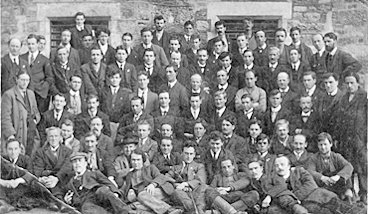|
Shortly after the COs arrived in Dartmoor the Daily Express sent down reporters who returned with mocking stories about the good living enjoyed by 'Princetown's Pampered Pets', the 'Coddled Conscience Men' and the 'COs' Cosy Club'. In the House of Commons, a Major Roland Hunt asked whether these men might not be offered to the Germans, in return for wounded British prisoners of war, while Sir Clement Kinlock-Cooke, MP for Devonport, pursued the 'work-shy’ inmates with a kind of Messianic hatred, that grew increasingly shrill as time went on. 'They work in overcoats, so as not to get cold, they wear woollen gloves to prevent their hands getting red . . .' He urged that their freedom and rations be curtailed, which they soon were: after the shipping losses, rations for prisoners, although not for civilians, were cut. 22 ounces of bread a day by the summer of 1917; by the beginning of November this was down to 11 ounces.(311gm, 700kc)
|

:: Many photographs were taken which could be sent to relatives and friends to reassure them. Groupings from different parts of the country were popular. The pictures here show the Yorkshire and London 'boys'.
|
|
Bitterness at Dartmoor intensified, with local civilians jostling and even physically assaulting the conscientious objectors as they went about their assigned work. Bertrand Russell led a campaign to expose the ridiculous penal nature of the work that clerks, doctors, painters and school teachers were being forced to carry out, and proposed that some serious thought now go to transforming it into what it should have been in the first place — work of national importance.
|
|
The Bishop of Exeter, on the other hand, returning from a visit to the Princetown camp and describing a state of 'seething intellectual anarchy', in a letter, which received wide publicity in the press. He had found the inmates, pursuing seditious correspondence in 'sackloads' of letters, 'no doubt conveying instructions for those plans of bloodshed . . . which may at some future time bring ruin to England'. Why not send the conchies somewhere where they could be put in touch with enemy bombers? 'The dropping of a bomb . . . would perhaps bring about a sudden conversion: or at any rate the whirr of the midnight raid might help them to a truer view of the political situation.'
|
|
